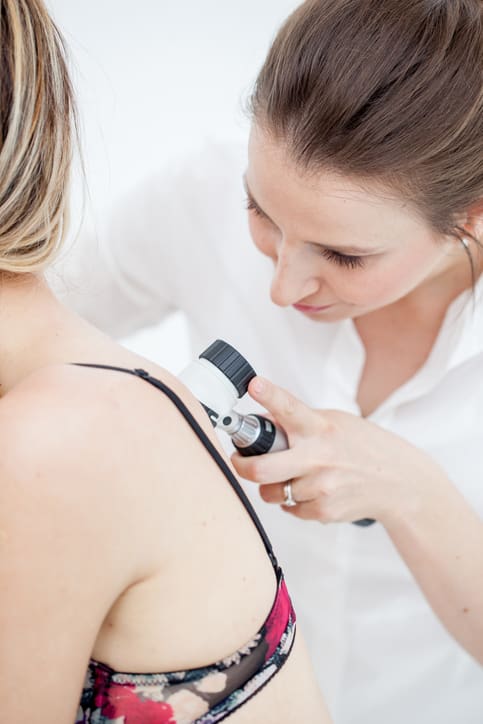Full Body Skin Exam in New York, NY
Skin cancer is the most common type of cancer in the United States. It’s an abnormal, and uncontrolled, growth of skin cells that develop on the body. The best way to treat and prevent skin cancer is through early detection & full-body examinations by a dermatologist. Dr. Dennis Gross started his career in skin cancer research and has been preventing & treating skin cancer for over 30 years. His highly trained staff follows his lead and education in the same expertise. At Dr. Dennis Gross Dermatology, we welcome patients in New York City, Queens, Brooklyn, and Staten Island to make an appointment with a board-certified dermatologist.
“Early detection of skin cancer can be lifesaving. Self–examine your skin every season and come in for a skin check once per year. Sun exposure from years ago can still cause skin cancer today.”
– Dr. Dennis Gross
What Can I Expect From My Full Body Skin Exam Procedure?
Dr. Dennis Gross has trained, taught, and performed in-depth medical research with a focus on skin cancer at world-renowned institutes, such as Rockefeller University and Memorial Sloan-Kettering. His patients come to him for regular mole checks because of his comprehensive background in skin cancer research, prevention, detection and treatment.

A full body skin exam is a routine office visit where our board-certified dermatologist will look over a patient's entire body to check for irregular moles, growths irritations and more. Our dermatologists will check your scalp and other hard to see areas. For your comfort, you can choose a full body skin exam by a female dermatologist or a male dermatologist.
If anything needs to be treated, biopsied or photographed or followed up with, this will be done during your visit. Early detection is KEY in treating & preventing skin cancer.
How Do I Know If a Spot is Skin Cancer?
Our board-certified dermatologists will thoroughly examine any and every spot on the body to determine what it is. There are a few key things you can look for at home to decide if you need to come in for an additional check-up:
- Asymmetry: One half of a skin growth does not match the other.
- Border: The edges (particularly on a mole) are irregular, ragged, notched, or blurred.
- Color: The color is uneven and may include multiple shades of brown, tan or black, or sometimes with patches of pink, red, or blue.
- Diameter: The growth or spot is larger than the size of a pencil eraser (larger than about one-quarter inch).
- Evolving: The growth is changing in size, shape, or color.
How Can I Prevent Skin Cancer?
Proper sun protection and regular full body skin exams are how to prevent any and all potential skin cancers.
Do I Still Need To Worry About Skin Cancer If I Have Dark Skin?
While people with a fair complexion and a history of burning when out in the sun are at high risk of cancer, any person, including those with a deeper skin tone, can develop skin cancer.
How High Of An SPF Do I Need To Wear in the Sun?
Proper SPF use and sun protection are key in keeping your skin safe. I believe in consistent applications of SPF 40-50 to be efficient. It is also very important to make sure the SPF product you’re using is a physical or mineral block, meaning the main ingredients are zinc oxide or titanium dioxide, not chemical like oxybenzone or avobenzone.
Anyone of our skincare experts can discuss proper sun protection with you at any time!
PS. All & any hats are welcome!
Real Patient Reviews
"Over a decade of care for my family of five, and it is always flawless! I love the staff and Dr. Gross and Dr. Reich. They are so helpful and user-friendly and very wise and conservative. I cannot recommend them highly enough."
- Liz C.
Skin Cancer Screening FAQs
Are there screenings for skin cancer?
Yes! Doctors are equipped to inspect the skin for any suspicious moles, birthmarks, or any other marks of concern.
What age should you be screened for skin cancer?
It is advised to start skin cancer screenings in your 20s or 30s. If you are exposed to the sun often, have a family history of skin cancer, or have many moles/birthmarks you should start skin cancer screenings sooner.
Should I get a skin cancer screening?
Screenings can help identify forms of skin cancer in its early stages and would be easier to treat. If you are at risk for developing skin cancer, it’s better to get annual skin cancer screenings.
A full body skin exam is one of the simplest and most effective tools in the early detection of skin cancer. If you have never had a skin exam before or you are concerned about a mole or pigmented lesion, please contact us at Dr. Dennis Gross Dermatology to schedule an appointment. We welcome men and women in New York City, Queens, Brooklyn, and Staten Island.
